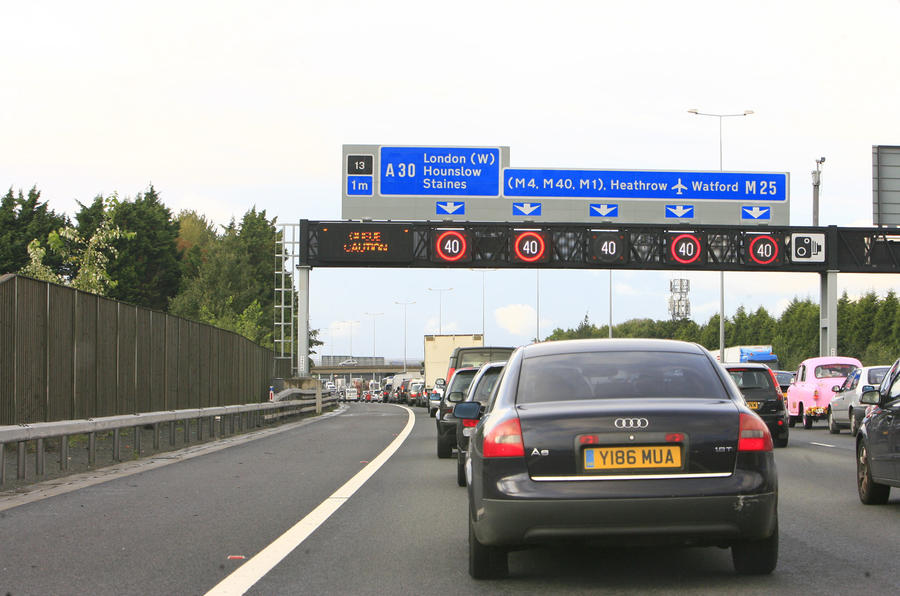A new survey conducted by polling organisation YouGov suggests the majority of the British public is opposed to the continued roll-out of smart motorways.
Asked whether they supported or opposed the use of all-lane-running motorways, which remove the hard shoulder in the name of improved traffic flow, 57% of the 1740 respondents said they opposed the scheme, while 25% said they supported it. The remaining 18% were unsure.
Some 64% of participants said they perceived smart motorways to be 'less safe' than conventional motorways, while 7% responded to the contrary. Again, 18% did not offer an opinion.
In response to the survey's findings, a Highways England (HE) spokesperson told Autocar: "In March 2020 the Government published a smart motorway evidence stocktake report and found that in most ways smart motorways are as safe as, or safer than, conventional ones.
“Overall the risks for road users are less compared to conventional motorways and the stocktake report indicates that smart motorways have reduced the casualty rate by 18%. Drivers need to be aware that on average one in 12 (8%) motorway fatalities happen on the hard shoulder.
“But we know people are concerned about breaking down and we are determined to do all we can to make our roads as safe as possible. We have already completed some of the actions set out in the Transport Secretary’s action plan. This includes installing more new technology which will detect if a vehicle has stopped in a live lane."
HE also pointed out that there were 27 fatalities on hard shoulders between 2014 and 2017, and suggested that motorists conduct pre-journey vehicle checks to minimise the risk of a breakdown in a live lane.
The results of the survey come a week after a Sheffield coroner found the deaths of two men on the M1 in 2019 could have been avoided if the stretch of motorway had a hard shoulder.
Coroner David Urpeth is leading calls for a review into the safety of smart motorways, following the deaths of Jason Mercer and Alexandru Murgeanu on 7 June 2019 when a lorry driven by Prezemyslaw Szuba crashed into their cars on a stretch of the M1 that had been converted to a smart motorway.
Recording a verdict of unlawful killing at Sheffield Town Hall on 18 January, Urpeth said such road layouts present "an ongoing risk of future deaths" and that he would write to Highways England and transport secretary Grant Shapps to request a review.









Join the debate
Add your comment
A few times I have seen a broken down car to which the gantry signs continue to warn you about for the next mile or more.
I admit, maybe some of them were just me at the wrong moment and the car they were warning about has just moved. But it happened so often that either the car moved and the signs weren't reset or who ever is controlling the signs were being over cautious having them extend way farther past the problem then needs be. Either way not exactly smart.
Either way what it led to was a fair number of people speeding up between cameras, especially when traffic was light.
And thats before I get onto people doing less the 70mph and staying in the 3rd lane...
I'm sure that the majority of the British public would also have voted to spend less time held up in motorway traffic jams. The only way to evaluate smart motorways is to look at the data. Compare the actual accident/death rate per mile on smart and non smart roads - and weigh up any excess against the cummulative extra time wasted by drivers in jams on normal motorways. Only then should a decision be made on whether to use them, improve them or drop the concept altogether.
Of course there are other strategies for preventing motorway hold ups. We could limit traffic entering motorways or introduce higher fuel prices, road tolls etc to make best use of the roads we already have - but then these measures would not prove popular either...
Widening motorways properly like we did in the past would be far better. If less money was spent on environmental consultants, and hugely expensive construction methods, to name just a couple of matters, proper widening could be carried out in a cost-effective manner. The UK has the highest construction costs of anywhere in the world. There is no reason that this has to be the case.
Sad for all the people concerned, especially the deceased. The Govt. has traded an easy cheap solution for safety and lives. The stress on British motorways is immense from this new idea of smart motorways, the increased average speed cameras and the obvious greed/drive to increase revenue at minimal cost.
My observation and 10 pence worth.